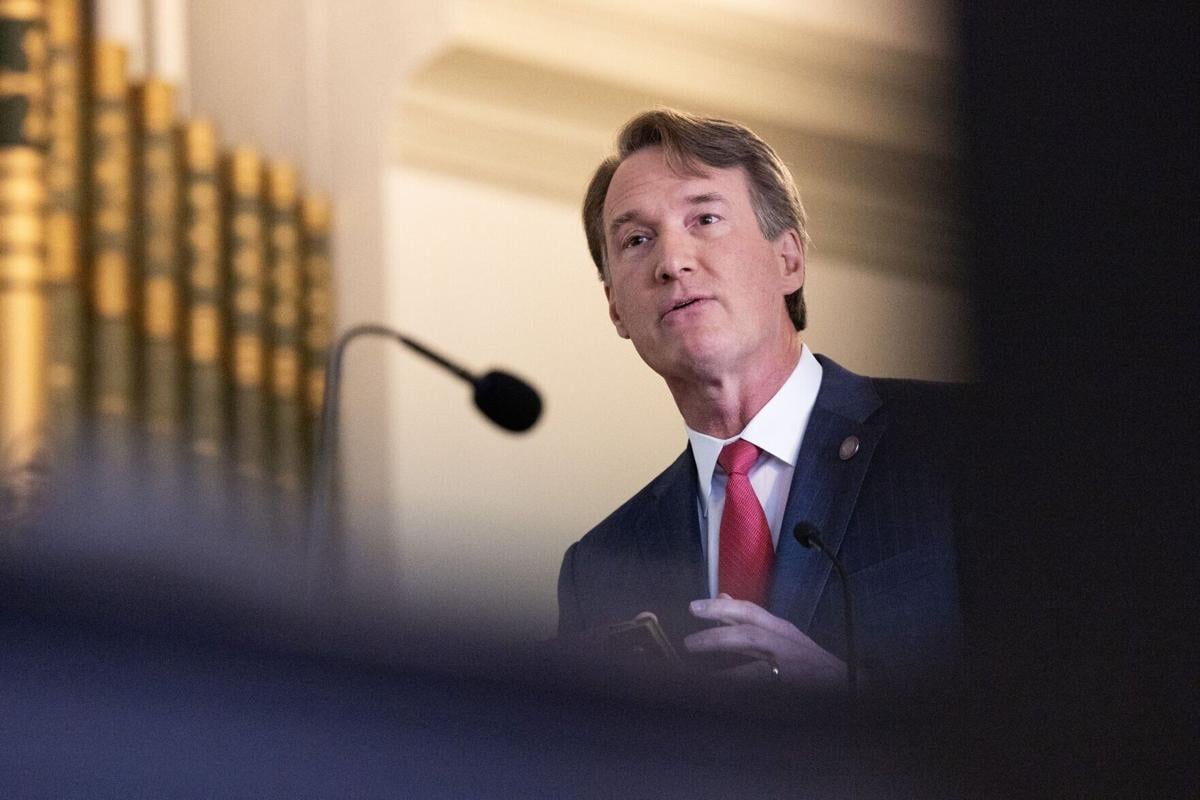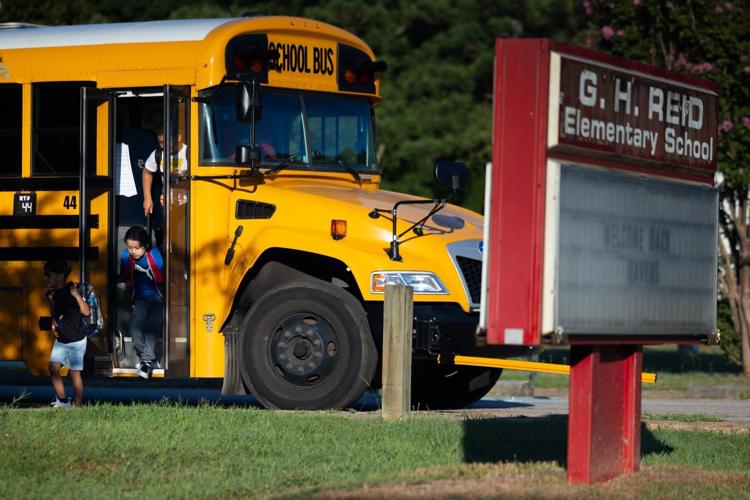A school custodian in begins each day by driving a bus. The day ends that way, too.
In between, custodians do their regular job in a public school district deep in Southwest Virginia to save money.
That’s part of the the price that the county school district pays to stay within a that Virginia placed on support services 15 years ago in the teeth of the .

Students step off a bus during the first day of school at G. H. Reid Elementary School on Aug. 19.
The cap means that school districts have less state money to support a wide range of jobs that play vital roles in public schools, including counselors, nurses, social workers and psychologists who provide “specialized student support” to those who need it.
People are also reading…
The cap also applies to state funding for school employees in operations and maintenance, technology services, health and administration, clerical duties and custodial work.
After years of trying, public school divisions thought this year that they would finally see the end of the “support cap” that then-Gov. Tim Kaine proposed in late 2009 as a temporary measure to prevent deep cuts in public services in the two-year state budget that the General Assembly approved the next year.

Gov. Glenn Youngkin, seen on March 23, said the initiative is meant to cut red tape and “fast-track game-changing projects.”
But upset those expectations by proposing to cut $138.2 million in additional funding that the General Assembly had added to the budget in February to fully lift the cap. That is almost two-thirds of the $222.9 million the legislature had approved to help local school divisions pay for those support positions.

Perrigan
If Youngkin’s proposed amendment prevails when the assembly reconvenes in Richmond on Wednesday to take up his amendments and vetoes, estimates it will cost the district between $700,000 and $1 million.
“That is a huge amount of money for Washington County,” Perrigan said. “It has a direct impact on the services we provide students.”
Democrats hold a 21-19 edge in the Senate and a 51-49 edge in the House.
The legislature could override the governor’s budget amendments by a simple majority vote. It takes a vote of two-thirds of the legislature to override a governor’s veto of legislation, which could mean the governor’s 157 vetoes of bills are likely to stand.
Additional money
Youngkin’s legislative supporters say the governor is not proposing to cut state funding for K-12 public education. They say he just wants to reduce the amount of additional money that state would spend in the fiscal year that will begin on July 1.

Senate Minority Leader Ryan McDougle, R-Hanover, notes that the governor is proposing to reduce additional money for school support positions, not cutting existing school funding.
“The question is what is the right amount of additional money for K-12?” said Senate Minority Leader Ryan McDougle, R-Hanover, a member of the Senate Finance & Appropriations Committee who strongly supported the revised budget that the assembly adopted on Feb. 22. “We’re all talking about more money for K-12.”
McDougle also thinks it’s fair for Youngkin to ask for $300 million in spending cuts to bolster the state’s revenue reserve. It comes as General Assembly Democrats warn that President Donald Trump is posing threats to the Virginia economy by slashing the federal work force and spending on which the state depends.
“If you really think the sky is falling, put your money where your mouth is,” he said.
The biggest part of those proposed spending cuts would come from money earmarked to eliminate the support cap — the top priority for local governments and school divisions that share the cost of public education with the state.
“The cap on state funding for support positions has shortchanged local school divisions for years and is one of the remaining relics of a time when the Commonwealth was sweeping the corner for funds to balance the budget,” said Joe Flores, director of fiscal policy at the Virginia Municipal League and former secretary of finance under Gov. Ralph Northam.
“Those days are over, and have been for some time.”
“At a time when local governments are finalizing their budget, including for schools, it is our hope that the governor’s proposal will be rejected and funding restored,” Flores said on behalf of the municipal league, which represents 38 cities, nine counties and more than 170 incorporated towns.
The municipal league and Virginia Association of Counties, which represents 95 counties, also worry about the governor’s proposed line-item veto of $40 million in stormwater local assistance funds and additional $31 million in the water quality improvement fund to, with multiple projects already planned to remove nutrient pollution from wastewater discharges.
“Those are big issues for us because the work has already been scheduled to be done and is being done,” said Dean Lynch, executive director of the association of counties.
Those vetoes will be harder for the General Assembly to overcome when it meets Wednesday because the state constitution requires a two-thirds vote to overturn a gubernatorial veto and Democrats can’t do it without help from Republicans.
Perrigan, the Washington County superintendent, said Youngkin’s proposed reduction of money for school support services hurts local school divisions of all sizes in all parts of the state.
He has a bird’s-eye view as president of the Virginia Association of School Superintendents, a statewide organization, and president of the Coalition for Small and Rural Schools of Virginia.
“The large school districts get hurt the most because they lose the most money,” he said. “The small districts lose the most because the money that they lose, they can’t replace.”

Anne Holton, a former state secretary of education and current member of the state Board of Education, says there are large disparities between school districts that can and cannot pick up additional costs for support services.
Former Virginia Secretary of Education Anne Holton, who was Virginia’s first lady when Kaine first proposed the support cap, said federal stimulus grants under then-President Barack Obama helped the state with the deficit initially, but then she said state funding for K-12 education dropped dramatically.
“Some localities picked up the difference, and some didn’t feel like they could,” Holton said. “And so that both means we’ve got wide disparities still and that the state’s just not doing its share.”
Del. Sam Rasoul, D-É«¶ŕ¶ŕ, chairman of the House Education Committee, called the governor’s proposal “disappointing.”
“There is such broad support for lifting the support cap, it is perplexing that it’s such a target,” Rasoul said.
Vouchers, lab schools
Democratic legislators also are indignant that Youngkin, while claiming to use the proposed spending cuts to bolster the state’s revenue reserves, also wants to spend money on priorities they already have rejected.
That includes $25 million in vouchers to pay for private school tuition or other extracurricular expenses and $15 million to expand the use of lab schools as alternatives to traditional public education.

Hashmi
Del. Mike Cherry R-Colonial Heights, carried legislation this session to establish the “opportunity scholarships” for low-income families.
“There’s so many things that the opportunity scholarships are available for use. Unfortunately, people in misunderstanding what we were trying to accomplish kind of made it a public versus private school binary choice, but that’s really not what the opportunity scholarship is all about,” Cherry said.

Cherry
“It could be used for tuition but that’s not the only thing it could go for. It could go for transportation to tutoring programs, whether that’s public or private. You could use it for resources, in terms of material and curriculums.”
Cherry noted the scholarships have been effective in other places like Maryland, Minnesota and Washington, D.C., where they predominantly hit low-income and minority communities.
“This is for our most vulnerable students,” Cherry said. “This is for the students who otherwise aren’t going to have a choice and aren’t going to have a chance to get these resources.”
“He’s back to the same playbook: he has been trying to divert public school dollars into private schools,” said Sen. Ghazala Hashmi, D-Chesterfield, who chairs the Senate Education and Health Committee.
“It is just bizarre that he is re-introducing these items, knowing that the General Assembly is not going to support the privatization of public school dollars,” said Hashmi, who is seeking the Democratic nomination for lieutenant governor.
Lynch, at the association of counties, said the governor’s proposal of “opportunity scholarships” to pay private school costs “creates problems for public education.”
“The only way to raise money for public education is through taxes,” he said. When you have money ... going to private schools and other entities, it’s pulling money away from public education.”
Senate Majority Leader Scott Surovell, D-Fairfax, denounced both the governor’s cuts in money to lift the support cap and his revival of proposals for funding alternatives to public education.
“It’s disappointing the governor keeps trying to bring up lab schools and vouchers,” Surovell told reporters this week. “I continue to believe that vouchers are unconstitutional under the constitution of Virginia.”
McDougle, the Senate Republican leader, said Youngkin simply “included some of his priorities that we had reduced” in the budget.
He noted that the governor “didn’t spend all of that money” that he proposed to cut, but instead recommended depositing an additional $300 million in the revenue reserve fund to guard against the economic downturn that Democrats say they fear.
“I think it’s a fiscally responsible move,” he said.
Hashmi said it’s a move in the wrong direction.
“It’s just a step backward, when we thought we were in a position this year to address what is almost two decades of underfunding in our school divisions,” she said.
In Southwest Virginia, Perrigan said school divisions such as his have been making do with less for years because they haven’t had the money to pay employees to do all of the jobs essential to operating a public school.
“We finally saw a little bit of light at the end of the tunnel,” he said.
Photos: Fox Elementary walkthrough

RPS Superintendent Jason Kamras, School Board member Mariah White and Mayor Levar Stoney laugh at a cardboard cutout at Fox Elementary on Monday.

City Council member Katherine Jordan, School Board member Mariah White, Mayor Levar Stoney and RPS Superintendent Jason Kamras tour William Fox Elementary in Richmond on Monday. An electrical fire broke out in the third-floor mezzanine on Feb. 11, 2022, and significantly destroyed large portions of the school’s interior.

RPS Superintendent Jason Kamras and School Board member Mariah White look at progress inside the “cafe-torium” at Fox Elementary on Monday.

City Council member Katherine Jordan, Director of School Construction Dana Fox and Alyssa Schwenk talk to Mayor Levar Stoney at Fox Elementary on Monday.

The “cafe-torium” is seen at Fox Elementary on Monday.

City Council member Katherine Jordan, Mayor Levar Stoney and RPS Superintendent Jason Kamras on Monday look at hardwood that will be installed at Fox Elementary.

The library under construction at Fox Elementary School is seen on Monday.

A hallway at Fox Elementary is seen on Monday.

Mayor Levar Stoney on Monday looks into a bathroom attached to a classroom at Fox Elementary.























